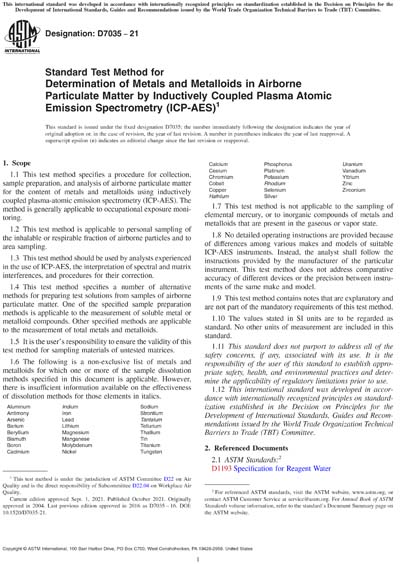Most recent
ASTM D7035-21
Standard Test Method for Determination of Metals and Metalloids in Airborne Particulate Matter by Inductively Coupled Plasma Atomic Emission Spectrometry (ICP-AES)
1.1This test method specifies a procedure for collection, sample preparation, and analysis of airborne particulate matter for the content of metals and metalloids using inductively coupled plasma-atomic emission spectrometry (ICP-AES). The method is generally applicable to occupational exposure monitoring.
1.2This test method is applicable to personal sampling of the inhalable or respirable fraction of airborne particles and to area sampling.
1.3This test method should be used by analysts experienced in the use of ICP-AES, the interpretation of spectral and matrix interferences, and procedures for their correction.
1.4This test method specifies a number of alternative methods for preparing test solutions from samples of airborne particulate matter. One of the specified sample preparation methods is applicable to the measurement of soluble metal or metalloid compounds. Other specified methods are applicable to the measurement of total metals and metalloids.
1.5It is the user's responsibility to ensure the validity of this test method for sampling materials of untested matrices.
1.6The following is a non-exclusive list of metals and metalloids for which one or more of the sample dissolution methods specified in this document is applicable. However, there is insufficient information available on the effectiveness of dissolution methods for those elements in italics.
1.7This test method is not applicable to the sampling of elemental mercury, or to inorganic compounds of metals and metalloids that are present in the gaseous or vapor state.
1.8No detailed operating instructions are provided because of differences among various makes and models of suitable ICP-AES instruments. Instead, the analyst shall follow the instructions provided by the manufacturer of the particular instrument. This test method does not address comparative accuracy of different devices or the precision between instruments of the same make and model.
1.9This test method contains notes that are explanatory and are not part of the mandatory requirements of this test method.
1.10The values stated in SI units are to be regarded as standard. No other units of measurement are included in this standard.
1.11This standard does not purport to address all of the safety concerns, if any, associated with its use. It is the responsibility of the user of this standard to establish appropriate safety, health, and environmental practices and determine the applicability of regulatory limitations prior to use.
1.12This international standard was developed in accordance with internationally recognized principles on standardization established in the Decision on Principles for the Development of International Standards, Guides and Recommendations issued by the World Trade Organization Technical Barriers to Trade (TBT) Committee.
Content Provider
ASTM International [astm]






